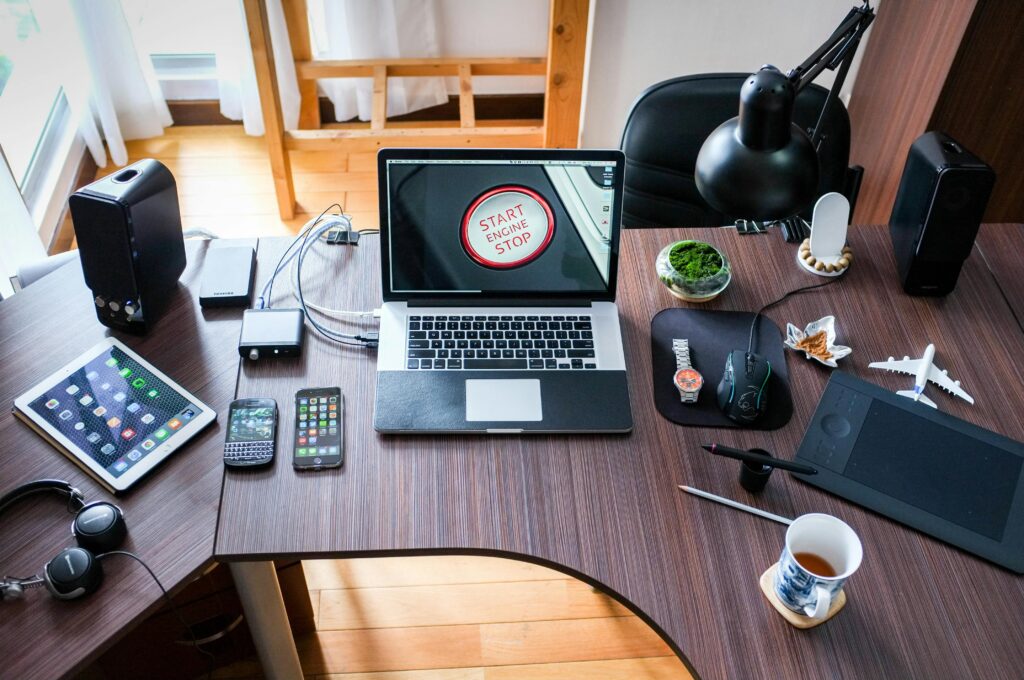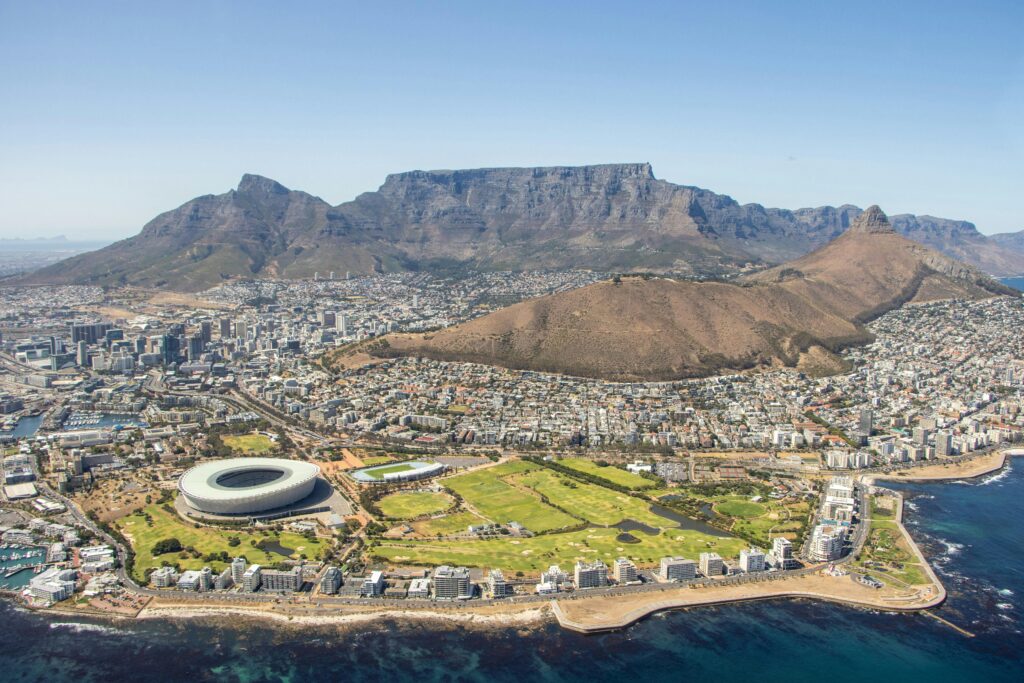Are you dreaming of swapping your cubicle for a beachside hammock? You’re not alone! According to MBO Partners’ 2024 Digital Nomads Report, in 2024, a staggering 18.1 million Americans described themselves as digital nomads. That’s a whopping 147% increase from pre-pandemic levels!
Whether you’re a seasoned professional or a fresh graduate, the world of location independence is calling. But let’s face it – transitioning to this digital nomad lifestyle isn’t just about packing your laptop and hopping on a plane. It’s a journey that requires planning, skills, and a dash of courage. Don’t worry, though! I’ve got your back.
In this Ultimate Digital Nomad Guide, we’ll walk you through everything you need to know to become a digital nomad in 2024. Ready to turn your wanderlust into a sustainable lifestyle? Let’s dive in!
Table of Contents
What is a Digital Nomad?
Alright, let’s dive into the world of digital nomads. Imagine waking up in a new city every few months, with your office being a cozy café in Paris one day and a beachside hut in Bali the next. Sounds dreamy, right? That’s the essence of being a digital nomad. But it’s not all sunshine and rainbows; there’s a lot more to it.
Definition and Characteristics
A digital nomad is someone who uses technology to work remotely while traveling. This lifestyle is all about flexibility and independence. You can work from anywhere as long as you have a reliable internet connection and a trusty computer. I remember when I first started, I was so excited about the freedom that I didn’t realize how important a stable internet connection was. Lesson learned the hard way in a remote eco-village with spotty Wi-Fi!

Digital nomads often work in fields like IT, marketing, writing, design, and consulting. These professions lend themselves well to remote work. I once met a graphic designer who created stunning visuals for clients all over the world, all from her laptop while sipping coconut water in Thailand. It’s amazing how technology can bridge the gap between continents.
Common Misconceptions
One big misconception is that being a digital nomad is like being on a permanent vacation. Sure, you get to explore new places, but you also have to balance work and play. Keep in mind that the beachfront rental with the magnificent sunset has to be paid for somehow. I remember a time when I was in East London, South Africa, and I had a deadline looming. While everyone else was out enjoying the city, I was holed up in said beachfront rental, typing away. It’s all about finding that balance.

Another myth is that this lifestyle is only for the young and single. That’s far from the truth. I’ve met families, couples, and even retirees who are digital nomads. It’s all about finding what works for you and your situation. Some people prefer a slower paced travel and spend more time getting to explore one place thoroughly – Slomading anyone?
Benefits and Challenges
The freedom to choose where and when you work while experiencing different cultures and lifestyles can be incredibly enriching.
However, it’s not without its challenges. Loneliness can be a big issue. Working on your own in an unfamiliar place can be tough. Being away from family and friends for the important life moments can eat away at you. How do you navigate the birthdays, weddings, births and illness when they happen? Joining local digital nomad communities can really help soothe some of those feelings of loneliness but stay connected with your peeps at home. It’s important to find your tribe, no matter where you are.
Unstable income is another challenge. Freelancers and remote workers often face inconsistent income. It’s crucial to have a financial cushion and budget wisely. And then there are the logistical issues – managing visas, finding reliable accommodations, and ensuring a stable internet connection. It’s all part of the adventure!
Being a digital nomad is an incredible journey filled with ups and downs. It’s about embracing the freedom and flexibility while navigating the challenges. If you’re considering this lifestyle, my advice is to dive in but be prepared for the unexpected. It’s a wild ride, but oh so worth it.
How to Become a Digital Nomad (with the help of our Digital Nomad Guide of course!)
The digital nomad lifestyle is exciting, but it requires careful planning and a bit of courage. Here’s a step-by-step guide to help you transition from a traditional job to a digital nomad lifestyle.
Steps to Transition from a Traditional Job to a Digital Nomad Lifestyle
- Assess Your Skills and Interests: Start by evaluating your current skills and interests. What can you do remotely? Are you a writer, designer, developer, or marketer? Identify your strengths and how they can be applied to remote work.
- Build a Remote-Friendly Skill Set: If your current skills aren’t easily transferable to remote work, consider learning new ones. Online courses and certifications can help you gain the necessary skills. Platforms like Coursera, Udemy, and LinkedIn Learning offer a wide range of courses.
- Find Remote Work Opportunities: Look for remote job opportunities on platforms like Remote.co, We Work Remotely, and FlexJobs. Networking can also be a powerful tool. Join online communities and attend virtual events to connect with potential employers or clients.
- Create a Financial Plan: Before you take the plunge, ensure you have a solid financial plan. Save up an emergency fund to cover at least three to six months of living expenses. This cushion will give you peace of mind as you transition.
- Set Up Your Workspace: Invest in a reliable laptop, noise-canceling headphones, and other essential gadgets. A comfortable and efficient workspace is crucial for productivity. Don’t forget to ensure you have access to a stable internet connection.
- Plan Your First Destination: Research potential destinations based on factors like cost of living, internet speed, and community. Websites like Nomad List can help you compare different locations. Start with a place that’s known for being digital nomad friendly.
- Handle Legal and Administrative Tasks: Make sure your passport is up to date and research visa requirements for your chosen destination. Consider getting travel insurance that covers health and work equipment. Also, look into banking options that allow easy access to your funds internationally.
- Join Digital Nomad Communities: Connect with other digital nomads through online forums, social media groups, and local meetups. These communities can provide valuable support, advice, and friendship.

Skills and Professions Suitable for Digital Nomads
- Writing and Content Creation: Blogging, copywriting, and content marketing are popular choices.
- Graphic and Web Design: Creative professionals can work on projects from anywhere.
- Software Development: Coders and developers are in high demand and can work remotely.
- Digital Marketing: SEO, social media management, and email marketing are great remote jobs.
- Consulting and Coaching: Offer your expertise in various fields through online consultations. Ever tried online teaching?
Tips for Finding Remote Work or Freelance Opportunities
- Leverage Job Boards: Use remote job boards like Remote OK, AngelList, and Upwork to find opportunities.
- Network: Attend virtual conferences, webinars, and join professional groups on LinkedIn.
- Build a Portfolio: Showcase your work through a professional website or portfolio. This can help attract clients and employers.
- Freelance Platforms: Sign up on platforms like Fiverr and Freelancer to find freelance gigs.
- Cold Pitching: Don’t be afraid to reach out to potential clients or companies directly. A well-crafted pitch can open doors.
Becoming a digital nomad is a journey filled with learning and growth. It’s about embracing the freedom to work from anywhere while navigating the challenges that come with it. Now let’s take a look at the oh-so-crucial tools required.
Essential Tools and Resources for Digital Nomads
Embarking on the digital nomad journey is thrilling, but having the right tools and resources can make all the difference. Here’s a rundown of the essentials that will help you stay productive, connected, and secure while exploring the world.
Must-Have Gadgets and Technology
- Reliable Laptop: Your laptop is your lifeline. Opt for something lightweight yet powerful. I personally swear by the MacBook Air for its portability and performance. It’s handled everything from video editing to running multiple apps without a hitch.
- Smartphone: A good smartphone is crucial for staying connected on the go. Whether it’s for communication, navigation, or managing tasks, a reliable phone is indispensable. I’ve found the iPhone to be a solid choice, but Android devices like the Samsung Galaxy series are also excellent.
- Portable Charger: Running out of battery in the middle of nowhere is a nightmare. A high-capacity portable charger can save the day. I always carry an Anker PowerCore with me; it’s saved me more times than I can count.
- Noise-Canceling Headphones: These are a game-changer, especially in noisy environments like airports or cafés. The Bose QuietComfort series is a favorite among digital nomads for its excellent noise cancellation and comfort.

Recommended Software and Apps for Productivity and Communication
- Project Management Tools: Tools like Trello and Asana help keep your projects organized and on track. I use Trello for its visual boards and easy collaboration features. It’s perfect for managing tasks and deadlines.
- Communication Apps: Staying in touch with clients and colleagues is vital. Slack and Zoom are my go-to apps for communication. Slack is great for team chats, while Zoom handles video calls seamlessly.
- Time Management Apps: Apps like Toggl and RescueTime help track your work hours and productivity. I’ve been using Toggl to log my hours, and it’s been incredibly helpful in managing my time effectively.
- Cloud Storage: Google Drive and Dropbox are essential for storing and sharing files. I prefer Google Drive for its integration with other Google services, but Dropbox is also a solid choice for its reliability.
Online Platforms and Communities for Digital Nomads
- Nomad List: This platform is a treasure trove of information on the best cities for digital nomads. It provides data on cost of living, internet speed, and community ratings. I’ve used it to plan my travels and find the best spots to work from.
- Remote Work Job Boards: Websites like Remote.co, We Work Remotely, and FlexJobs are excellent for finding remote job opportunities. I landed my first remote gig through We Work Remotely, and it’s been a fantastic resource ever since.
- Digital Nomad Communities: Joining online communities like Digital Nomad Facebook groups or Reddit’s r/digitalnomad can provide support and networking opportunities. I’ve made some great connections and received invaluable advice from these communities.
Cybersecurity Solutions
- VPN (Virtual Private Network): A VPN is essential for securing your internet connection, especially on public Wi-Fi. I use NordVPN for its speed and security features. It’s a must-have for protecting your data.
- Password Manager: Managing multiple passwords can be a hassle. Tools like LastPass and 1Password keep your passwords secure and easily accessible. I’ve been using LastPass, and it’s made my life so much easier.
- Antivirus Software: Protecting your devices from malware is crucial. I recommend using software like Bitdefender or Norton. They offer comprehensive protection without slowing down your devices.
Travel Resources
- Accommodation Platforms: Websites like Airbnb and Booking.com are great for finding short-term rentals. I’ve had some amazing stays through Airbnb, from cozy apartments in Europe to beachfront villas in Asia.
- Flight Booking Tools: Skyscanner and Google Flights are my go-to tools for finding the best flight deals. They offer flexible search options and price alerts, helping me save money on travel.
- Travel Insurance: Don’t skip on travel insurance. Companies like World Nomads offer comprehensive coverage for digital nomads. I’ve had to make a claim once, and their service was top-notch.
Having the right tools and resources can make your digital nomad experience smoother and more enjoyable. It’s all about finding what works best for you and staying adaptable. Happy travels!
Best Destinations for Digital Nomads
Choosing the right destination is crucial for a successful digital nomad experience. The perfect spot combines good internet, affordable living, and a vibrant community. Here are some of the best destinations for digital nomads in 2024.
Bali, Indonesia
Bali is often at the top of the list for digital nomads, and for good reason. The island offers a unique blend of beautiful beaches, rich culture, and a thriving digital nomad community. Ubud and Canggu are particularly popular areas. The cost of living is relatively low, and there are plenty of co-working spaces like Dojo Bali and Hubud. Plus, the local food is delicious and affordable.
Why Bali?
- Affordable cost of living
- Strong digital nomad community
- Beautiful scenery and cultural experiences

Chiang Mai, Thailand
Chiang Mai has been a digital nomad hotspot for years. Known for its laid-back vibe and affordable living, it’s a great place to start your digital nomad journey. The city is filled with co-working spaces and cafés with reliable Wi-Fi. The local markets offer delicious food at low prices, and there’s a strong sense of community among digital nomads.
Why Chiang Mai?
- Low cost of living
- Reliable internet and numerous co-working spaces
- Friendly and welcoming community
Lisbon, Portugal
Lisbon is a fantastic European destination for digital nomads. The city boasts a mild climate, stunning architecture, and a vibrant cultural scene. The cost of living is higher than in Southeast Asia, but still affordable compared to other Western European cities. Lisbon has excellent internet connectivity and plenty of co-working spaces. The city’s digital nomad community is growing, making it easy to network and make friends.
Why Lisbon?
- Mild climate and beautiful architecture
- Growing digital nomad community
- Excellent internet connectivity

Medellín, Colombia
Medellín has transformed into a digital nomad haven over the past few years. The city offers a pleasant climate, affordable living, and a burgeoning tech scene. El Poblado is a popular neighborhood for digital nomads, with plenty of co-working spaces and cafés. The local community is friendly, and there are many opportunities to learn Spanish and immerse yourself in Colombian culture.
Why Medellín?
- Affordable cost of living
- Pleasant climate
- Growing tech scene and digital nomad community
Tbilisi, Georgia
Tbilisi is an emerging destination for digital nomads. The city offers a unique blend of Eastern European and Asian cultures, affordable living, and a welcoming atmosphere. Georgia has a liberal visa policy, allowing many nationalities to stay for up to a year. The internet is reliable, and there are several co-working spaces popping up around the city. Plus, the local cuisine is a delightful mix of flavors.
Why Tbilisi?
- Affordable cost of living
- Liberal visa policy
- Unique cultural blend and delicious cuisine

Cape Town, South Africa
Cape Town is a stunning destination with a lot to offer digital nomads. The city boasts beautiful landscapes, from beaches to mountains, and a vibrant cultural scene. The cost of living is moderate, and there are plenty of co-working spaces and cafés with good internet. Cape Town’s digital nomad community is growing, and there are many opportunities for outdoor activities like hiking and surfing.
Why Cape Town?
- Beautiful natural landscapes
- Vibrant cultural scene
- Growing digital nomad community

These destinations offer a mix of affordability, community, and culture, making them ideal for digital nomads. Each place has its unique charm and benefits, so it’s worth exploring to find the one that suits you best. Happy travels!
Managing Finances as a Digital Nomad
Managing your finances as a digital nomad can be a bit tricky, but with the right strategies, you can keep your budget in check and ensure financial stability. Here’s a comprehensive guide to help you navigate the financial aspects of the digital nomad lifestyle.
Budgeting Tips and Financial Planning
- Create a Detailed Budget: Start by listing all your expected expenses, including accommodation, food, transportation, insurance, and leisure activities. Use tools like Mint or YNAB (You Need A Budget) to track your spending. I remember my first month on the road; I was shocked at how quickly small expenses added up. Keeping a detailed budget helped me stay on track.
- Set Financial Goals: Determine your short-term and long-term financial goals. Whether it’s saving for a big trip, investing in your business, or building an emergency fund, having clear goals will guide your spending and saving habits.
- Monitor Your Cash Flow: Keep a close eye on your income and expenses. Regularly review your bank statements and use apps like PocketGuard to monitor your cash flow. This helps you avoid overspending and ensures you’re living within your means.
- Save for Emergencies: Life on the road can be unpredictable. Aim to save at least three to six months’ worth of living expenses in an emergency fund. This cushion will give you peace of mind and financial security in case of unexpected events.

Banking and Currency Exchange Options
- Choose the Right Bank: Opt for a bank that offers low or no foreign transaction fees. Online banks like N26 and Revolut are popular among digital nomads for their low fees and ease of use.
- Use Multi-Currency Accounts: Multi-currency accounts allow you to hold and exchange multiple currencies at favorable rates. Wise (formerly TransferWise) offers a borderless account that’s perfect for digital nomads.
- ATM Withdrawals: Look for banks that offer free or reimbursed ATM withdrawals worldwide. Charles Schwab and Fidelity are known for their no-fee ATM policies. This can save you a significant amount over time.
- Currency Exchange Apps: Use apps like XE or Revolut to get the best exchange rates. Avoid exchanging money at airports or tourist areas where rates are often less favorable.
Managing Taxes and Legal Considerations
- Understand Your Tax Obligations: Tax laws can be complex for digital nomads. It’s crucial to understand your tax obligations in your home country and any countries you spend significant time in. Consulting with a tax professional who specializes in expat taxes can save you a lot of headaches.
- Keep Detailed Records: Maintain detailed records of your income, expenses, and travel history. This will make tax filing easier and help you take advantage of any deductions or credits you’re eligible for.
- Consider Tax Residency: Some digital nomads choose to establish tax residency in countries with favorable tax laws. This can be a complex process, so it’s important to do thorough research and seek professional advice.
- Stay Compliant with Visa Regulations: Ensure you’re aware of and comply with visa regulations in the countries you visit. Overstaying your visa can result in fines or bans from re-entering the country.
Insurance and Healthcare
- Travel Insurance: Invest in comprehensive travel insurance that covers health, travel delays, and lost or stolen belongings. World Nomads and SafetyWing are popular choices among digital nomads.
- Health Insurance: Ensure you have health insurance that covers you internationally. Some travel insurance plans include health coverage, but you may need a separate policy for long-term stays. Companies like Cigna and Aetna offer global health insurance plans.
- Telemedicine Services: Use telemedicine services like Teladoc or Doctor on Demand for medical consultations while abroad. This can save you time and money compared to visiting local clinics.
Managing your finances as a digital nomad requires careful planning and discipline, but it’s entirely doable.
Staying Healthy and Productive on the Road
Staying healthy and productive while living the digital nomad lifestyle can be a bit of a balancing act, but it’s absolutely doable with the right strategies. Here’s how you can keep your mind and body in top shape while traveling the world.
Tips for Maintaining Physical and Mental Health
- Establish a Routine: One of the biggest challenges of being a digital nomad is the lack of a consistent routine. Try to establish a daily schedule that includes time for work, exercise, meals, and relaxation. I found that sticking to a morning routine, no matter where I was, helped me start the day on the right foot.
- Stay Active: Incorporate physical activity into your daily routine. Whether it’s a morning jog, yoga session, or a visit to the local gym, staying active is crucial. I love exploring new cities on foot or by bike; it’s a great way to stay fit and see the sights.
- Eat Healthily: It’s easy to fall into the trap of eating out all the time but try to maintain a balanced diet. Opt for local fruits and vegetables and cook your own meals when possible.
- Stay Hydrated: Traveling can be dehydrating, especially on long flights. Always carry a reusable water bottle and make sure you’re drinking enough water throughout the day. I’ve made it a habit to drink a glass of water first thing in the morning.
- Prioritize Sleep: Good sleep is essential for both physical and mental health. Try to maintain a regular sleep schedule. I use a white noise app to drown out unfamiliar sounds and help me sleep better.
- Mental Health: Don’t neglect your mental health. Practice mindfulness or meditation and take breaks when you need them. I use apps like Headspace for guided meditation sessions, which help me stay grounded and focused.

Strategies for Staying Productive While Traveling
- Set Clear Goals: Define your work goals and break them down into manageable tasks. Use tools like Trello or Asana to keep track of your projects. I set weekly goals and review them every Sunday to stay on track.
- Create a Dedicated Workspace: Find a quiet, comfortable place to work. Whether it’s a co-working space, a café, or a corner of your Airbnb, having a dedicated workspace can boost your productivity. I always scout for good work spots as soon as I arrive in a new city.
- Use Productivity Tools: Leverage productivity tools like Pomodoro timers, task managers, and note-taking apps. I use the Pomodoro technique to break my work into focused intervals, which helps me stay productive without burning out.
- Manage Your Time Zones: Working across different time zones can be challenging. Use tools like World Time Buddy to keep track of time differences and schedule meetings accordingly. I always double-check my calendar to avoid any mix-ups.
- Stay Connected: Reliable internet is a must. Invest in a portable Wi-Fi device or a local SIM card to ensure you’re always connected. I’ve found that having a backup internet option is crucial, especially in remote areas.
- Take Breaks: Don’t forget to take regular breaks to avoid burnout. Step outside, stretch, or take a short walk. I follow the 50/10 rule – work for 50 minutes, then take a 10-minute break. It keeps me refreshed and focused.

Balancing Work and Leisure
- Set Boundaries: It’s important to set boundaries between work and leisure time. Define your work hours and stick to them. I prefer an early start, around 5am. This allows me to knock-off early and enjoy some late afternoon down time.
- Explore and Enjoy: Make time to explore your surroundings and enjoy the local culture. Schedule leisure activities and treat them as important as your work tasks. I always plan my weekends in advance to make the most of my time in each location.
- Network and Socialize: Join local digital nomad groups or attend meetups to network and socialize. It’s a great way to make friends and find support. I’ve met some amazing people through digital nomad communities, and it’s made my travels much more enjoyable.
Staying healthy and productive on the road is all about finding what works best for you and sticking to it. With the right habits and tools, you can enjoy the freedom of the digital nomad lifestyle while maintaining your well-being and productivity.
Building your Digital Nomad Community
Building a community as a digital nomad is essential for both personal and professional growth. It can help combat loneliness, provide support, and open up new opportunities.
Importance of Networking and Building Connections
Networking is crucial for digital nomads. It’s not just about making friends; it’s about building a support system and creating opportunities for collaboration. I remember when I first started, I felt isolated and missed the camaraderie of an office environment. Joining a local digital nomad group changed everything. Suddenly, I had people to share experiences with, exchange tips, and even collaborate on projects.
Online and Offline Communities for Digital Nomads
- Online Communities: There are numerous online platforms where digital nomads can connect. Facebook groups like “Digital Nomads Around the World” and Reddit’s r/digitalnomad are great places to start. These communities are filled with people sharing advice, job opportunities, and travel tips.
- Co-Working Spaces: Co-working spaces are fantastic for meeting other digital nomads. They provide a professional environment to work in and often host events and meetups. Spaces like WeWork, Impact Hub, and local co-working spots are great places to network. I’ve attended workshops and social events at co-working spaces that have led to lasting friendships and business partnerships.
- Meetups and Events: Attend local meetups and events specifically for digital nomads. Websites like Meetup.com and Eventbrite list events in various cities. I once attended a digital nomad meetup in Lisbon and ended up collaborating on a project with someone I met there. These events are perfect for networking and learning from others.
- Nomad Retreats and Conferences: Consider joining nomad retreats or conferences. Events like Nomad Summit and 7in7 Conference bring together digital nomads from around the world. These gatherings are not only educational but also a lot of fun. I attended a retreat in Bali, and it was an incredible experience that left me with new friends and fresh ideas.
Tips for Making Friends and Finding Support
- Be Open and Approachable: Don’t be afraid to strike up conversations with fellow nomads. Whether it’s at a co-working space, a café, or a meetup, being open and approachable can lead to meaningful connections. I’ve made some of my best friends by simply saying hello and asking about their work or travel experiences.
- Join Local Activities: Participate in local activities and classes. Whether it’s a cooking class, a language course, or a yoga session, these activities are great for meeting people with similar interests.
- Offer Help and Collaboration: Be willing to help others and collaborate on projects. Sharing your skills and knowledge can build trust and strengthen your network. I once helped a fellow nomad with a website issue, and in return, they introduced me to a client who became a long-term partner.
- Stay Connected: Keep in touch with the people you meet. Use social media, messaging apps, and email to maintain relationships. I make it a point to check in with my nomad friends regularly, whether it’s through a quick message or a virtual coffee chat.

Building a digital nomad community takes effort, but it’s incredibly rewarding. It provides a sense of belonging and support, making the nomadic lifestyle more enjoyable and sustainable. So, get out there, connect with others, and build your tribe.
Overcoming Challenges as a Digital Nomad
Living the digital nomad lifestyle is an incredible adventure, but it comes with its own set of challenges. Here’s how you can navigate and overcome some of the most common hurdles.
Common Challenges Faced by Digital Nomads
- Loneliness and Isolation: One of the biggest challenges is feeling lonely and isolated. Being away from family and friends can be tough, especially when you’re in a new place where you don’t know anyone. I remember my first few weeks in Bali; despite the beautiful surroundings, I felt incredibly lonely. It took some time to find my community and feel at home.
- Unstable Income: Freelancers and remote workers often face inconsistent income. There are months when you’re flush with cash and others when you’re scraping by. I’ve had my fair share of financial ups and downs, and it’s taught me the importance of budgeting and saving.
- Visa and Legal Issues: Navigating visa requirements and legalities can be a headache. Each country has its own rules, and overstaying your visa can lead to fines or bans. I once had to make a last-minute trip out of Thailand because I miscalculated my visa days. It was stressful and expensive.
- Reliable Internet: Finding a stable internet connection is crucial but not always easy. I’ve had moments where I was in the middle of an important video call, and the internet cut out. It’s frustrating, but it’s part of the nomad life.
- Work-Life Balance: Balancing work and leisure can be challenging. It’s easy to get caught up in work and forget to explore your surroundings, or vice versa. I’ve had weeks where I was so focused on work that I barely left my apartment, missing out on the local culture.
Practical Solutions and Coping Strategies
- Build a Support Network: Join local digital nomad groups and online communities. Attend meetups and co-working spaces to meet like-minded people. I found that having a support network made a huge difference in combating loneliness. It’s comforting to know there are others who understand your lifestyle.
- Budget Wisely: Create a detailed budget and stick to it. Save during the good months to cover the lean ones. I use apps like YNAB to track my expenses and ensure I’m living within my means. Having an emergency fund has also been a lifesaver.
- Stay Informed About Visas: Research visa requirements before you travel and keep track of your visa days. Use apps like Passport Index or websites like VisaHQ to stay updated. I now set reminders on my phone to check my visa status regularly.
- Invest in Backup Internet: Carry a portable Wi-Fi device or get a local SIM card with data. I always have a backup internet option, especially in remote areas. It’s saved me from missing deadlines and important calls.
- Set Boundaries: Define your work hours and stick to them. Make time for leisure and exploration. I’ve learned to shut down my laptop by 6 PM and enjoy the evenings. It’s important to find a balance that works for you.
Overcoming challenges as a digital nomad is all about being prepared and adaptable. With the right strategies and mindset, you can navigate the hurdles and enjoy the incredible freedom and opportunities that come with this lifestyle.
Let’s wrap this up…
Embarking on the digital nomad journey in 2024 is an exciting adventure that offers unparalleled freedom and opportunities for personal growth. From mastering essential skills to navigating the complexities of remote work and global travel, you’re now equipped with the knowledge to turn your nomadic dreams into reality. Remember, becoming a digital nomad is not just about changing your work environment – it’s about embracing a whole new lifestyle filled with rich experiences and endless possibilities.
As you step into this brave new world, keep an open mind, travel sustainably, stay adaptable, and never stop learning. The road ahead may have its challenges, but the rewards of a location-independent life are truly priceless. So, pack your bags, fire up your laptop, and get ready to join the growing tribe of global digital nomads. The world is waiting for you – go out there and make your mark!
Safe travels and happy nomading!





